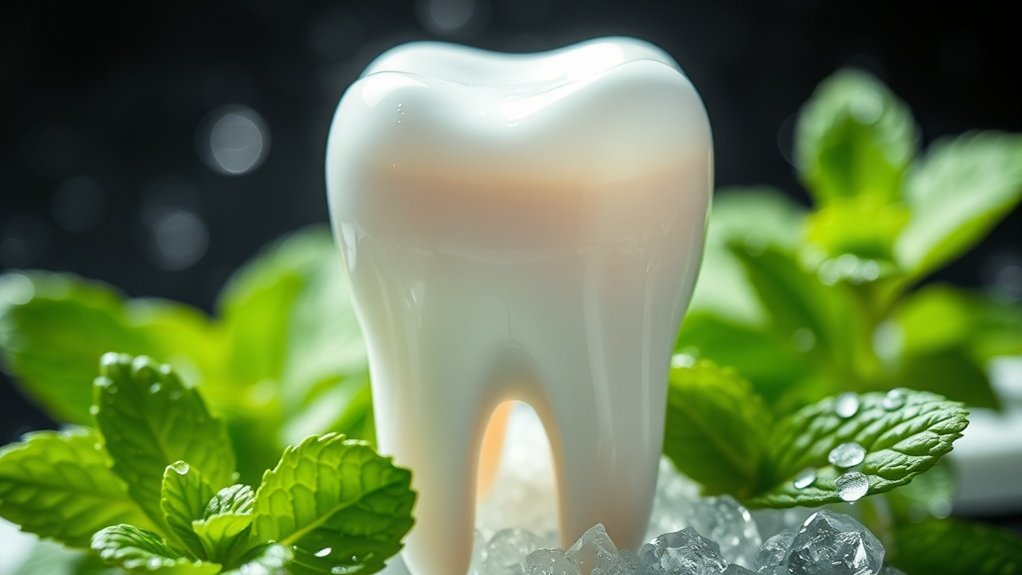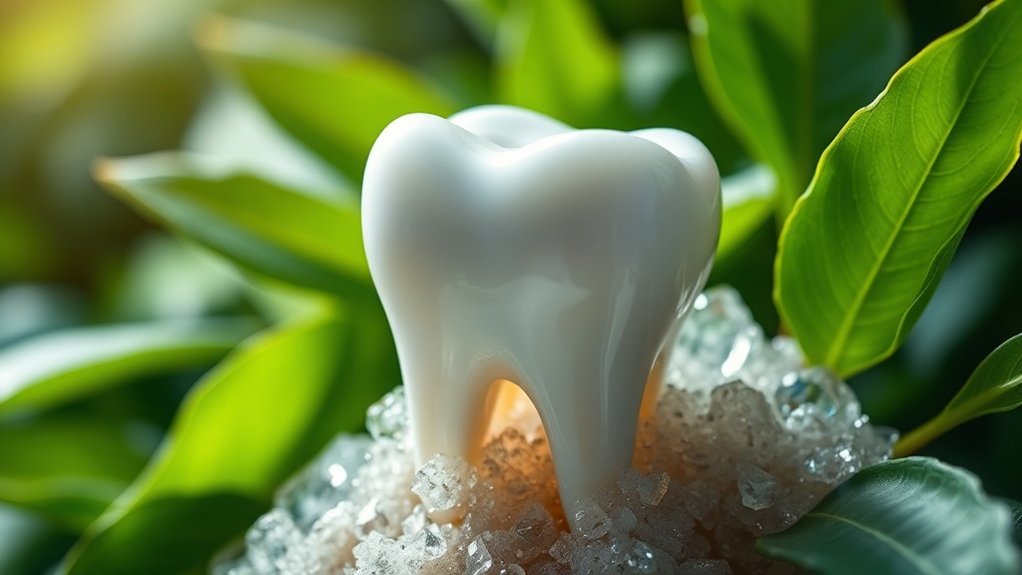The dicalcium phosphate in Prodentim stands out compared to traditional minerals in dental products due to its superior ability to remineralize and strengthen enamel. This compound enhances mineral absorption, making teeth more resilient against decay. It works synergistically with saliva to neutralize acids and repair early enamel damage, resulting in improved dental health. Users report noticeable benefits such as reduced sensitivity and enhanced gum health. Discovering more about these advantages can further enhance your understanding of effective oral care.
Key Takeaways
- Dicalcium phosphate enhances mineral content in teeth, improving enamel health beyond the capabilities of many traditional dental products.
- It supports effective calcium and phosphorus absorption, crucial for preventing cavities and maintaining dental strength.
- Compared to fluoride, dicalcium phosphate reinforces enamel rather than forming a protective barrier, offering a different approach to dental care.
- Users report improved enamel density and reduced tooth sensitivity with Prodentim, highlighting its effectiveness over standard mineral-based dental products.
- Prodentim’s formulation with dicalcium phosphate aligns with consumer preferences for natural and holistic oral health solutions.
Understanding Dicalcium Phosphate: What It Is and How It Works
Dicalcium phosphate is an essential mineral compound that plays a significant role in various biological processes, particularly in dental health. You might not realize how important it is for maintaining oral health, as it contributes to the formation and strength of your teeth. Dicalcium phosphate aids in mineral absorption, helping your body utilize calcium and phosphorus effectively. This absorption is critical for preventing dental issues, such as cavities and enamel erosion. Studies indicate that incorporating dicalcium phosphate into dental products can enhance remineralization, improving overall tooth structure. By understanding its functions, you can appreciate how dicalcium phosphate supports your oral health, ensuring your teeth remain strong and resilient against decay and other challenges.
The Role of Minerals in Dental Health
Minerals play a pivotal role in maintaining dental health, influencing everything from tooth structure to the prevention of decay. Key minerals like calcium and phosphorus are essential for enamel reinforcement, providing strength and resilience against harmful bacteria and acids. When you engage in proper dental care, incorporating mineral-rich products can enhance your oral health greatly. Dicalcium phosphate, for instance, not only helps remineralize enamel but also supports overall dental structure. This mineral works synergistically with saliva to neutralize acids and repair early signs of tooth decay. By ensuring you receive adequate minerals, you can effectively reduce the risk of cavities and promote a healthier smile, making informed choices in your dental routine vital for long-term health.
Comparing Dicalcium Phosphate to Fluoride
While both dicalcium phosphate and fluoride play essential roles in dental health, they function through different mechanisms and offer distinct benefits. Dicalcium phosphate acts primarily as a source of dental minerals, enhancing enamel strength by providing calcium and phosphate ions that remineralize tooth surfaces. This process helps to strengthen enamel and combat early signs of decay. On the other hand, fluoride is well-known for its cavity prevention properties. It strengthens enamel by forming a protective barrier, making it more resistant to acid attacks from bacteria. While both compounds contribute to oral health, dicalcium phosphate focuses on enhancing mineral content, whereas fluoride specifically targets cavity prevention, making them valuable components in extensive dental care.
The Benefits of Dicalcium Phosphate in Oral Care
When considering effective ingredients in oral care products, dicalcium phosphate stands out for its ability to enhance enamel health and support overall dental hygiene. This compound provides a source of calcium, essential for maintaining strong teeth. Research indicates that dicalcium phosphate not only aids in enamel repair but also helps in the prevention of cavities by promoting mineralization. Unlike some dental products that solely focus on fluoride, dicalcium phosphate offers a dual benefit—reinforcing enamel while effectively reducing plaque accumulation. Its gentle formulation makes it suitable for everyday use, contributing to long-term oral health without causing sensitivity. Incorporating dicalcium phosphate into your dental routine can lead to noticeable improvements in enamel strength and overall dental well-being.
How Dicalcium Phosphate Enhances Remineralization
Dicalcium phosphate plays an essential role in the process of remineralization, acting as a key player in restoring lost minerals to tooth enamel. By providing calcium and phosphate ions, it helps strengthen enamel, enhancing decay resistance. This mineral aids in dentin protection, ensuring that the underlying tooth structure remains intact against bacterial invasion. The presence of dicalcium phosphate can also positively influence the oral microbiome, promoting a balanced environment that discourages harmful bacteria. Research indicates that when you incorporate dicalcium phosphate into your oral care routine, you bolster your teeth’s natural ability to remineralize, reducing the risk of cavities and enhancing overall dental health. Consequently, it’s a valuable addition for maintaining strong, healthy teeth.
Traditional vs. Modern Dental Products: A Mineral Perspective
The effectiveness of dental products hinges considerably on their mineral content, which directly impacts oral health outcomes. Traditional dental products often rely on fluoride as the primary mineral for teeth protection, promoting remineralization and preventing decay. However, modern formulations, like those containing dicalcium phosphate, enhance this approach by providing additional minerals that actively support enamel health. These mineral supplements can improve bioavailability, allowing your teeth to absorb beneficial nutrients more efficiently. Research shows that products enriched with dicalcium phosphate not only protect against cavities but also aid in repairing early enamel damage. As you choose between traditional and modern dental products, consider the mineral composition and its direct influence on your overall dental health.
User Experiences With Prodentim and Dicalcium Phosphate
User experiences with Prodentim and its dicalcium phosphate content reveal varying perceptions of its effectiveness in promoting oral health. Many users report noticeable improvements in their dental hygiene compared to traditional mineral supplements. However, some individuals express skepticism, prompting comparisons that highlight the unique benefits and limitations of Prodentim.
Effectiveness in Oral Health
While exploring the oral health benefits of Prodentim, many individuals have reported notable improvements linked to the inclusion of dicalcium phosphate in their daily regimen. Users have noted that this ingredient contributes positively to their overall oral wellness, particularly in the following areas:
- Reduced tooth sensitivity, allowing for a more comfortable eating experience.
- Enhanced enamel strength, providing better protection compared to traditional dental products.
- Improved gum health, which is vital for preventing periodontal issues.
These experiences suggest that dicalcium phosphate may effectively address common dental concerns, enhancing both comfort and health. By integrating Prodentim into your routine, you might find a significant difference in your oral health, especially if you’ve struggled with sensitivity or other dental issues in the past.
Comparisons to Traditional Minerals
Many people have begun comparing their experiences with Prodentim and dicalcium phosphate to traditional minerals used in oral health products. Users often report that Prodentim enhances enamel density more effectively than conventional dental products containing fluoride or calcium carbonate. This increased enamel density contributes greatly to cavity defense, as stronger enamel is less prone to decay. Additionally, testimonials suggest that dicalcium phosphate in Prodentim offers a gentler approach, reducing sensitivity while still providing robust protection. In contrast, traditional minerals sometimes lead to enamel erosion over time. Overall, many find that Prodentim’s formulation offers a balanced solution, merging efficacy with safety, making it a compelling alternative to standard dental minerals.
Future Trends in Dental Health Ingredients
As the demand for innovative dental health solutions grows, emerging trends in dental ingredients are reshaping how we approach oral care. You’ll notice a shift toward natural and bioactive components that enhance oral hygiene and promote healthy teeth. Key trends include:
- Probiotics: These beneficial bacteria improve oral flora, reducing cavities and gum disease.
- Plant-based extracts: Ingredients like green tea and neem offer antibacterial properties without harsh chemicals.
- Advanced mineral formulations: Innovations such as calcium phosphate and fluoride alternatives strengthen enamel and provide long-lasting protection.
These developments not only reflect consumer preferences for safe and effective dental products but also underline a growing awareness of holistic oral health. Staying informed about these trends can enhance your understanding of ideal oral care practices.
Frequently Asked Questions
Is Dicalcium Phosphate Safe for Long-Term Use in Dental Products?
Yes, dicalcium phosphate is safe for long-term use in dental products. It effectively strengthens teeth and reduces decay risk, backed by research. Just make certain you’re following recommended guidelines for ideal results and minimal side effects.
How Does Dicalcium Phosphate Affect Teeth Sensitivity?
Dicalcium phosphate can help reduce teeth sensitivity by providing essential minerals that strengthen enamel. It remineralizes damaged areas, improving overall tooth health. You’ll likely notice less discomfort when consuming hot or cold foods and beverages.
Can Children Use Dental Products Containing Dicalcium Phosphate?
Yes, children can use dental products containing dicalcium phosphate. It’s effective for strengthening enamel and reducing cavities. However, always supervise their usage and consult a pediatric dentist to guarantee safety and appropriate application.
What Are the Side Effects of Dicalcium Phosphate in Oral Care?
Dicalcium phosphate in oral care can cause mild side effects like mouth irritation, gum sensitivity, or allergic reactions in some individuals. However, most users tolerate it well, experiencing no significant issues when used as directed.
How Does Dicalcium Phosphate Compare to Calcium Carbonate in Dental Products?
Dicalcium phosphate acts like a sturdy bridge, enhancing enamel remineralization more effectively than calcium carbonate. Its unique properties promote better fluoride retention, making it a preferred choice in dental products for protecting your smile.
Conclusion
In the landscape of dental health, dicalcium phosphate stands as a robust sentinel, guarding your teeth with its mineral-rich embrace. Unlike traditional fluoride, it fosters a natural remineralization process, paving the way for a healthier smile. As you navigate the sea of dental products, consider how Prodentim’s unique formulation harnesses this powerful ingredient, transforming your oral care routine into a proactive journey. Embracing dicalcium phosphate could be your bridge to a brighter, stronger future for your teeth.





